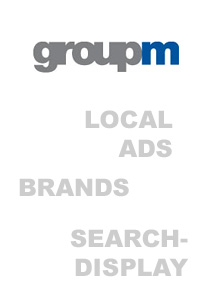 Recently, GroupM Search made available a new, 8-page white paper titled, “Perception vs. Execution: Examination of Brands’ Local Business Strategies Reveals Gaps to Act On.” The agency says that its “a gap in what national advertisers perceive they’re doing in the local digital space and what they’re actually doing.” GroupM says that local digital spending is expected to increase by 18% by 2012, with local online spend projected to surpass all other channels by 2015. See the paper.
Recently, GroupM Search made available a new, 8-page white paper titled, “Perception vs. Execution: Examination of Brands’ Local Business Strategies Reveals Gaps to Act On.” The agency says that its “a gap in what national advertisers perceive they’re doing in the local digital space and what they’re actually doing.” GroupM says that local digital spending is expected to increase by 18% by 2012, with local online spend projected to surpass all other channels by 2015. See the paper.
Chris Copeland is CEO of GroupM Search, the specialist search engine marketing division within WPP’s GroupM. He discussed the implications of the findings with AdExchanger.
AdExchanger: Beyond geo-targeting, what other optimization tactics can a search marketer use to address the capture of local intent?
CC: Given that Google now allows campaign settings to capture searches based on intent, utilizing those tools is now a more essential part of a paid search campaign. Also, incorporating ad extensions related to local are important to local intent in search. For example, connecting local-oriented campaigns with Google Places accounts for both location ad extensions and/or phone ad extensions are strong local intent moves. Additionally, many brands may not have fully-optimized mobile sites and search marketers may not be utilizing mobile ads because of this. However, by connecting mobile campaigns to Google Places accounts, search marketers can utilize the click-to-call only ad extension, thereby bypassing the need to send traffic to mobile sites and capturing that mobile-local intent search traffic.
Does “brand” need to be localized for every market? If so, to what extent?
It’s funny that this question is never really asked of brick-and-mortar locations. Online local is simply the digital reflection of what is done in a brand’s physical locations. If a brand “localizes” their brick-and-mortar locations, the same considerations, tactics and practices need to be done with their digital locations, especially on sites such as Google Places and Bing/MSN local where the tactics (full optimization of listing, couponing, etc.) are still free.
What are your thoughts on how Facebook will impact local?
With more than 800 million users and the continuing influence of social media in general, Facebook naturally has a large impact on local. Facebook’s own stats show that while national brand pages make up 6% of all Facebook pages, local business pages make up 18% of all Facebook pages. Local business engagement on Facebook outnumbers national engagement by 3-to-1. Facebook is successful because it is personal and relevant. Additionally, all of the major search engines are now using social signals and citations in their search results, making social engagement more important than ever.
On the agency side, what are the keys to offering effective specialization in local media?
It is key for agencies to understand that local reaches far beyond paid search, but to also realize that non-PPC local efforts are not in competition with paid search efforts. Local digital advertising across various forums should be supplemental and complimentary to paid search. Secondly, it’s important for agencies to know their client’s business objectives to determine if there is actually a local play for them outside of search because location-based marketing tools are not a fit for every client. For instance, a tire manufacturer would have a difficult time implementing local tactics as they generally do not directly own or manage storefronts, unless they have a targeted, specialized local objective. The same goes for an entertainment (media) client, or a client that makes products sold outside of their own sales channel. Lastly, it is of importance for agencies to develop a holistic plan that encompasses every applicable local tactic, but one that can be implemented in different stages. Because local digital marketing is relatively new, not all brands are able or desire to take on a large amount of new spend without knowing its direct (and immediate) payoff.
Is there a unique search-display opportunity with local?
Most sites through which display can be bought offer targeting on a local level, but prices may vary depending on how many markets and to what level of targeting a company wants to do. Facebook offers display ad targeting on a very micro-level, but consensus is mixed on the effectiveness of this type of media on the local ecosystem. Online local is truly, at its core, about discoverability at the moment of consumer intent and decision. When a consumer is ready to make a purchase and they are trying to find the location at which to make their purchase, they are typically not surfing the Web looking at display advertising.
Switching to the sell-side, what do you think this data says for the local publisher? “Local” can be bought through national and global media properties after all.
It’s absolutely correct to suggest local can be bought, but the real question is should it be bought that way. For the immediate future, that’s probably an acceptable behavior. Our view is that the value proposition, over time, can and will get better at a local level. If developed and curated properly the quality of content associated with local publishers can create premium opportunities. Anything short of that, as an aspiration and an ultimate realization, from the publisher side will leave advertisers content to do national deals.
By John Ebbert











